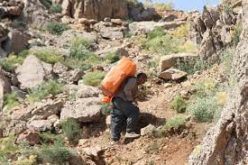Radiofarda – The saber-rattling over the decision by U.S. President Donald Trump to pull out of the Joint Comprehensive Plan of Action (JCPOA), or Iran’s nuclear deal with world powers, has intensified between the two rival camps in Iran.
Friday Prayer ceremonies across the country presented a platform for supporters of Supreme Leader Ayatollah Ali Khamenei to use Washington’s withdrawal from JCPOA as a tool to attack President Hassan Rouhani’s performance in the 2013-2015nuclear talks.
In response, Ali Akbar Nateq Nouri, a former right-leaning prominent cleric who recently joined the reformist camp, said conservatives are using the JCPOA news as an excuse to settle scores with Rouhani and his supporters.
“Some of the local critics of JCPOA, either intentionally or inadvertently, are using Washington’s withdrawal from the nuclear deal to settle scores with the government,” he said.
Nateq Nouri, a veteran politician and mid-ranking cleric, told journalists on May 18, “Those who deliberately table devastating criticism against the government to settle political scores are not aware that their behavior paves the way for the failure of the internal front and the success of enemy designs.”
Nateq Nouri also served as chief of Khamenei’s Inspection Bureau but resigned from the influential post last year to support the incumbent Rouhani’s re-election. He recently became more active in the reformist camp led in tandem by Rouhani and former President Mohammad Khatami.
In an unprecedented session last April, prominent reformists — including Khatami and Nateq Nouri — cautioned Rouhani against stalling on his campaign promises.
Five days before Nateq Nouri’s defense of Rouhani, a statement attributed to the influential Assembly of Experts (AE) lambasted Rouhani’s administration for JCPOA and the United States’ withdrawal.
The statement, later relabeled as the AE chairman’s “personal communique,” maintained that Khamenei had reservations about the nuclear deal but had accepted JCPOA after repeated requests by Rouhani and his team.
AE Ayatollah Ahmad Jannati demanded that Rouhani apologize for not respecting the “red lines” set by Khamenei. Several close allies of the supreme leader echoed the comments, casting doubt on Rouhani’s ongoing talks with Europe to keep JCPOA alive.
The commander of the Islamic Revolutionary Guards Corps (IRGC), Mohammad Ali Jafari, implicitly blasted Rouhani and his nuclear talk team by criticizing “certain officials” who “turn to foreigners,” adding, “I hope recent events will lead us to end our trust in the West and the Europeans.”
“The Europeans have repeatedly proved they are not capable of resisting U.S. sanctions,” the IRGC-run Fars news agency cited Jafari as saying.
Though the deal now looks shaky after Trump announced the U.S. withdrawal from it earlier this month, Rouhani and his team are maneuvering to keep it alive by seeking unspecified “guarantees” from the remaining countries still party to JCPOA.
Conservative allies of Khamenei, however, apparently see no point in remaining loyal to JCPOA after Washington’s withdrawal. They blame Rouhani and his nuclear team for the failure of the deal.
Immediately after Trump announced his decision to drop JCPOA, 100 conservative MPs issued a written protest admonishing Rouhani for not seeking sufficient guarantees to prevent violations of the deal.
“You should have demanded powerful and indestructible guarantees, including a written commitment to lifting sanctions imposed on Tehran, signed by the president of the U.S.A. and the EU,” the conservative MPs said.
In response, government spokesman Mohammad Baqer Nobakht said on May 15, “We have no more time to confront enemies on one front and watch our friends on the other lest they stab us in the back.”
The notorious anti-Rouhani Friday Prayer leader in the city of Mashhad, mid-ranking cleric Ayatollah Ahmad Alam al-Hoda, continued to censure the government for its “doomed” nuclear talks.
“From day one, the supreme leader insisted that he did not trust them [the United States and its European allies]. He said we would achieve nothing from negotiating with them save losses and damages,” he said. “Yet his eminence let the government go ahead and see for itself that they [U.S. and EU] would not stay committed to their promises.”
“After the deal was signed, the leader noted that the deal would be worthy only when the U.S. president commits himself in writing to lifting all sanctions imposed on the Islamic Republic,” he continued.
 Shabtabnews In this dark night, I have lost my way – Arise from a corner, oh you the star of guidance.
Shabtabnews In this dark night, I have lost my way – Arise from a corner, oh you the star of guidance.



